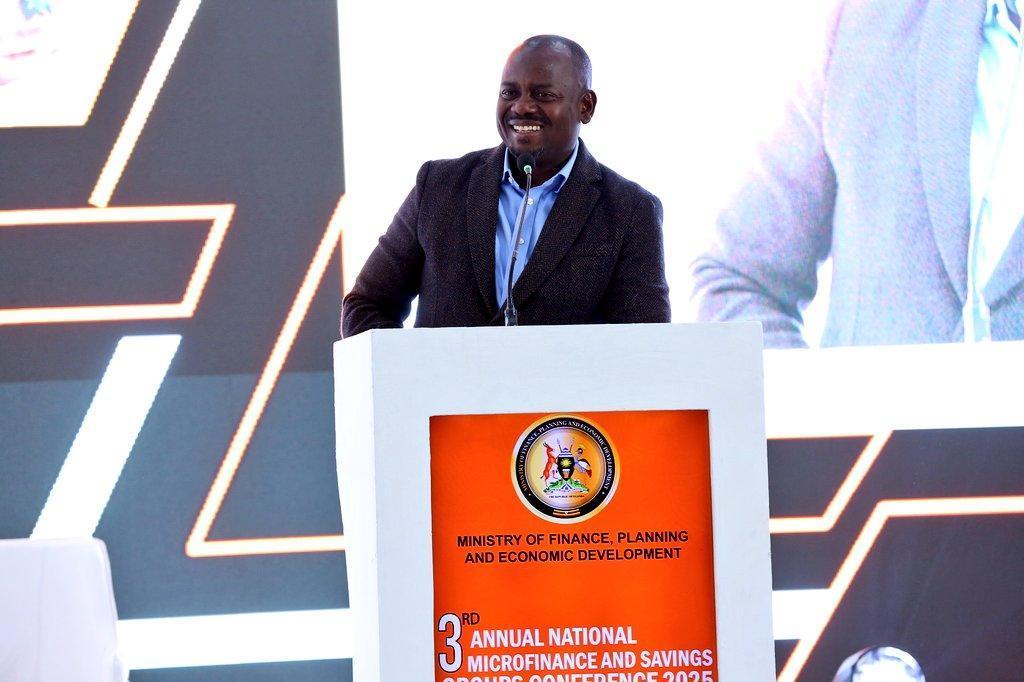Africa-Press – Uganda. The Minister of State for Microfinance, Haruna Kasolo, has called on business operators, financial leaders, and entrepreneurs to safeguard Uganda’s economic stability throughout the election period, warning that the economy must not be disrupted by political activities.
Speaking at the 3rd Annual National Microfinance and Savings Groups Conference 2025, Kasolo said Uganda’s strength lies in maintaining a stable and inclusive financial system.
The conference, held under the theme “Sustainable Financial Inclusion for Environmental, Economic and Social Impact,” brought together more than 400 participants from microfinance institutions, savings groups, and government agencies to discuss strategies for deepening financial inclusion and community development.
Kasolo cautioned against the rise of poorly managed savings and credit groups, saying a lack of financial literacy and governance undermines public trust and the savings culture.
“Some people start savings and microfinance groups without the knowledge to manage them effectively. This not only undermines financial inclusion but also threatens the trust and savings culture we are trying to build,” he said.
He further urged financial operators to work constructively with political leaders to prevent disruptions in business operations during campaigns.
“Our economy must not be held hostage by politics. Regardless of the season, business and financial growth should continue unhindered,” he said.
The minister reaffirmed the government’s commitment to supporting community-based financial groups through the Emyooga Programme, which offers affordable credit to Ugandans in various enterprises.
However, he expressed concern that some beneficiary groups lack accountability and technical skills.
“We will continue to monitor and support these groups to ensure they operate transparently and sustainably. The Emyooga initiative must deliver results, not just promises,” he said.
Permanent Secretary and Secretary to the Treasury (PSST) Ramathan Ggoobi, who also addressed the conference, underscored microfinance as a cornerstone of economic transformation.
“Microfinance has long stood as a transformative force — a catalyst that lifts families out of poverty, empowers women, and fuels the growth of micro and small enterprises,” he noted.
Ggoobi cited data from the 2023 Finscope Report showing that financial inclusion in Uganda has risen to 81%, up from 70% in 2009, largely due to the expansion of mobile money services, now used by 66% of Ugandans.
He said Uganda’s vision of becoming a $500-billion economy will depend on expanding access to affordable finance and education as key “opportunity equalizers.”
“Education and financial inclusion are the greatest equalizers in life. We must ensure that every Ugandan, even those in the subsistence economy, benefits from financial services,” he said, adding that the government has invested over Shs11 trillion in wealth creation programmes over the past decade.
James Onyutta, Chairperson of the Association of Microfinance Institutions of Uganda (AMFIU), urged the government to strengthen regulation of money lenders, citing exploitative lending practices that burden low-income borrowers.
Accompanied by AMFIU Executive Director Winnie Mbabazi, Onyutta called for responsible lending and closer collaboration between regulators and microfinance institutions to protect vulnerable borrowers.
The conference concluded with a call for stronger policy frameworks linking financial inclusion with environmental sustainability and social progress, positioning microfinance as a driver of equitable and inclusive economic growth.
For More News And Analysis About Uganda Follow Africa-Press






